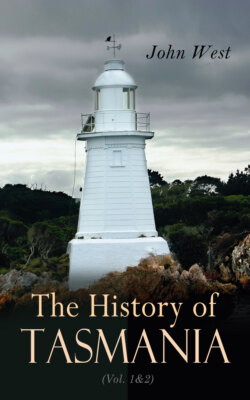Читать книгу The History of Tasmania (Vol. 1&2) - John West - Страница 13
На сайте Литреса книга снята с продажи.
FOOTNOTES:
Оглавление[41] Ross's Almanack, 1829.
[42] Ibid, 1835.
[43] Wordsworth's Sonnet to the Derwent.
[44] Colonel Paterson had been distinguished by his researches in Africa, and had gained considerable reputation as a botanist. This spirit of enterprise and intelligence he always preserved: he directed the government botanical establishment at Parramatta, and the French delineated his attainments with more than their usual enthusiasm. He superintended the exotic plantation provided for the colonies, and the repository of native shrubs intended for the gardens at Kew. His name not unfrequently occurs as an adjunct to the scientific descriptions of the botanist. Formerly acting governor and commander of the military corps of New South Wales, he was not unsuitable for the more direct duties of his office. It is, however, as a naturalist that he is remembered. He planted trees: some are still growing amidst the desolation of York Town. He was the first who attempted to improve the grass of the country. He was the author of a volume of travels, published in 1789, entitled, Narrative of Four Journies into the Country of the Hottentots and Caffraria, in the years 1777–8, and 9.
[45] Sydney Gazette, 1806.
[46] Ibid, May, 1812.
[47] Ibid, May, 1807.
[48] Lieut. Lord's Evidence, Par. Pap., 1812.
[49] Johnstone's Trial, p. 337.
[50] Sydney Gazette, 1808.
[51] "After numerous observations, we found it—Lat. 29° 4' 40". Long. 161° 12' East Greenwich."—Hunter's Historical Journal.
[52] Backhouse's Journal.
[53] Collins.
[54] Holt gives the following curious anecdote:—"The Rev. Henry Fulton was reading the commandments, when Tony Chandler sung out—'turn out, you d——d villians, and launch the boat!' As I was going out, I said to Mr. Fulton, 'I perceive Tony Chandler's word has more power here than the word of God.' Fulton smiled, and shook his head."—Memoirs, vol. ii. p. 232.
[55] "At a distance, I saw about fifty men at work, as I thought dressed in nankeen jackets, but on nearer approach I found them naked, except trousers: they had each a kind of large hoe, about nine inches deep and eight wide, and the handle as thick as a shovel, with which they turned up the ground."-Holt's Memoirs, vol. ii. p. 79.
[56] The work is written with considerable strength of delineation; although his accounts are not quite safe authority for the character of his enemies. His words he spelled after a provincial pronunciation: thus, describing the crew of the Sydney, he writes, instead of Sepoys and Lascars, "Saypies and Glascars."
[57] Of the women at Rio, he says—"Their skin is equal in clearness to the skin of a new laid egg: their eyes black as sloes; their hair like polished jet; their teeth as even as rows of printing, and as white as pearls; their eye-brows like those of a doll: their feet and legs, as if they were modelled in wax-work. They are the most complete patterns of the neatest form of a woman!"
[58] Wentworth.
[59] Derwent Star, January, 1810.
[60] Cunningham's Two Years in New South Wales, p. 201.
[61] Derwent Star, February, 1810.
[62] Peron's Voyage.
[63] "It was, we must confess, very provoking to see the officers draw goods from the public store, to traffic in them for their own private gain, which goods were sent out for the advantage of the settlers, who were compelled to deal with those huckster officers for such articles as they might require; giving them from 50 to 500 per cent. profit, and paying them in grain."—Memoirs of Holt, vol. ii. p. 296.
[64] The instance given by Mr. Wentworth (p. 202), of a man who was sent by Bligh with a note to the constable, who was directed to flog him, without informing him of its purport, however it might read in London, will not seem enormous to a colonist, who could produce many parallel cases; it was a practice too common.
[65] In 1702, Colonel Bayard was tried in New York, charged with having used divers indirect practices and endeavours to procure mutiny and desertion among the soldiers in the fort, &c. For sending a petition to the home government, which received a few military signatures, against the governor and the ruling faction, he was condemned to death—in the horrid terms included in the penalty of high treason. Before the sentence was executed, Lord Cornbury arrived: the chief justice fled to England; Lord Cornbury, however, it is said; destroyed the factions of New York, by oppressing them both: "and the contest soon began, which ended in the establishment of a free and independent nation."—Chandler's American Trials. Boston: vol. i. p. 294.
[66] Lang's History of New South Wales, vol. i. p. 110.
[67] Dr. Lang states, that "he was obliged to sign an agreement to quit the colony forthwith; but instead of proceeding to England, Governor Bligh landed at the Derwent."—(vol. i. p. 121). And seems rather to extenuate this breach of faith. Were no agreement of this class binding the rigours of captivity and civil strife could never be mitigated. The following is Bligh's own statement:—"I took the Porpoise on the terms they proposed to me, and the moment I got the command of the Porpoise, I took care to keep it, and would not suffer any of these terms, or any thing which they said to have the least influence on my mind."—Johnstone's trial, p. 33.
[68] Horse Guards. July 1811.
[69] New South Wales Gazette, 1810.
[70] Printed by J. Barnes and T. Clark, at the Government Press, Hobart Town.
[71] Derwent Star, March 6th, 1810.
[72] Collins's Peerage: of venerable authority.—Quarterly Review, 1820.
